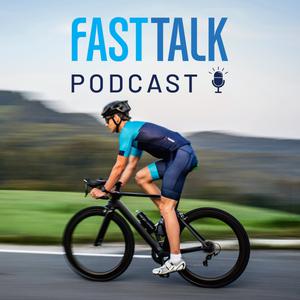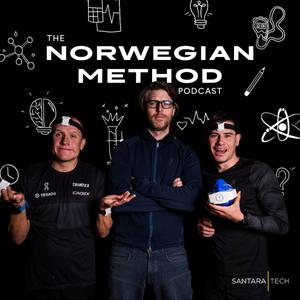
The Real Science of Sport Podcast
Professor Ross Tucker and Mike Finch
Ross shares some thoughts and concerns about the recent developments with the IOC Transgender Guideline
- 1 hour 39 minutesThe Role of the Modern Physio: Lessons from the Royal Marines
Richard Hales has spent the last 22 years fixing Royal Marines at the Command Training Centre Royal Marines (CTCRM) Lympstone in the UK and is the Clinical Lead within their bespoke Exercise Rehabilitation Centre. So he knows a thing or two about the role of physiotherapy in a pressurised physical environment. The team delve into the role of a physiotherapist in both prevention and recovery; explains how data drives much of the research, why old-school physio techniques are questionable and whether biomechanics make a difference in causing chronic injury.
Hales graduated with a Sports Science degree from Liverpool University in 1992 before qualifying as a Chartered Physiotherapist from Bath University in 1996.
Having chosen to specialise in musculoskeletal rehabilitation his roles have included six years as Physio with Exeter Chiefs Rugby Union Club, and clinical co-ordinator for Amputee rehabilitation within ‘Adventure Rehab’, as well as Out-Patient work in both the UK and New Zealand before joining the military.
He has just written a book about his time working with the Royal Marines entitled The NOD Fixer which is due out in Easter 2025.
Join Discourse
If you fancy a bit of the coaching, sports science and sports news conversations with our amazing members, consider a small donation to become a Patron of the site, and get access to our Discourse community, where you can join like-minded fans and sports enthusiasts to keep the conversation going.
Get bonus content on PatreonHosted on Acast. See acast.com/privacy for more information.
17 January 2025, 9:25 am - 57 minutes 49 secondsScience of Sport Spotlight 2: Can We Trust Experts in Fitness and Health?
Can we trust "experts" in the fitness and health industry? We put this question under the Spotlight this week, inspired by a combination of Gareth's fell running exploits and virus scare, his quest to replenish carbohydrates after racing, and a fascinating insider Discourse chat about the credibility of the fitness industry. How can fitness, health and sports enthusiasts know who to trust, and can they ever be assured of credible, effective advice from personal trainers and fitness influencers whose intentions may be good, but whose knowledge is not always where it needs to be?
Show notes
Join Discourse
If you fancy a bit of the coaching, sports science and sports news conversations with our amazing members, consider a small donation to become a Patron of the site, and get access to our Discourse community, where you can join like-minded fans and sports enthusiasts to keep the conversation going.
Get bonus content on PatreonHosted on Acast. See acast.com/privacy for more information.
15 January 2025, 2:59 pm - 1 hour 27 minutesWhat Will Sport Look Like in 2050?
A lot has changed since 2000 in sport but not everything predicted at the start of the Millennium has happened by 2025. So what may sport look like in 2050? Hosts Mike Finch and Prof. Ross Tucker - along with the Chief Sports Writer of The Guardian, Sean Ingle - look back at what was predicted in 2000 and what could happen 25 years from now. From age-defying world beaters to astonishing tech and the likely future and popularity of sporting events, sport looks set for some radical changes in the second quarter of this century.
SHOW NOTES
Sean’s article looking back at the 2000 predictions
Sean’s article predicting sport in 2050
Another article by Sean in which he discusses the case for an Olympics every two years
The article that predicts that most records will reach a plateau by 2027
Example of how digital twins are being used in sport
Speaking of digital twins, Des Linden has one, as explained in this article
An article on how AI is changing sport.
Get bonus content on PatreonHosted on Acast. See acast.com/privacy for more information.
9 January 2025, 3:06 pm - 49 minutes 27 secondsScience of Sport Spotlight 1 of '25: Festive feedback
Gareth and Ross kick off 2025 with a brief Spotlight episode that looks back on the Festive season's interesting sports science news stories, and our own Christmas and New Year exercise achievements and sports-watching highlights. Discourse hummed along at its usual pace, with stories on doping, low cadence, cycling safety, and exercise challenges, and Gareth and Ross tackle those subjects in this 2025 'ice-breaker'.
Show notes
Join Discourse
If you fancy a bit of the coaching, sports science and sports news conversations with our amazing members, consider a small donation to become a Patron of the site, and get access to our Discourse community, where you can join like-minded fans and sports enthusiasts to keep the conversation going.
Articles on topics discussed in this show
Get bonus content on PatreonHosted on Acast. See acast.com/privacy for more information.
8 January 2025, 2:30 pm - 2 hours 10 minutesThe 2024 Sports Year In Review
Who were the superstars, and what were the unforgettable moments of 2024? Who failed to launch, and who exceeded expectations? What are your hopes for sport and sports science in 2025? We draw a spectacular sporting year to a close with a look back at the highlights, lowlights, newsmakers and big stories of 2024. In a somewhat tongue-in-cheek "Sporting Awards" show, Mike, Gareth and Ross pick out their winners and losers, and the achievements that got us talking and debating. Inspired by the contributions and nominations from our Discourse community, we make our selections in categories ranging from the Moment of the Year to the Biggest Anticlimax of the last twelve months, with sports science insights and the big sports science stories covered in between.
Join Discourse
If you fancy sports science and sports news conversations with our amazing members, consider a small donation to become a Patron of the site, and get access to our Discourse community.
Podcast highlights: Some of the podcasts from 2024 that came up in this show:
- Dr Joe Warne on the scientific theme of 2024: Can we trust sports science?
- The Skeptics guide to sports science - Dr Nick Tiller joined us to talk about how marketing undermines sports science, with a little help from sports scientists
- As Gareth noted on the show, the podcast topic that generated the highest volume of Discourse chat was VO2max, your most important training metric
- Prof Louise Burke joined us to talk about why carbohydrates and not fats power most endurance athletes to better performance
- Prof Stuart Phillips on weight training - the one that changed Mike's exercise training routines.
- The science of hydration - this is the one that led to a really lively Discourse discussion about the scientific 'robustness' of hydration claims made on this show
- The Olympic Controversy podcast recorded at the time of the DSD controversy
- Ruth Chepngetich smashed the women's World Record, and the debate kicked off. We did a podcast on it in October
- We named BJSM as "Worst Team of the Year". This is the podcast we did on their shameful stance on women's sport and loss of scientific credibility
Hosted on Acast. See acast.com/privacy for more information.
19 December 2024, 12:00 pm - 1 hour 2 minutesElite Sport's Race to the Bottom, and Anti-Doping's Scramble for Higher Ground
In this Spotlight edition, Gareth Davies and Ross Tucker dive ever deeper into the abyss of sport's Talent Identification and Development inefficiencies. With a nod to our most recent podcast on Gout Gout's meteoric rise and anticipated trajectory to sprint dominance, we discuss how elite sport 'farms' talent in a 'race to the bottom' that characterises the ruthless pursuit of champions. We discuss the costs this creates, both financial and human, using talent pathway practices in cycling, football, rugby and tennis to illustrate why lost young athletes and inefficiencies are features of the system, rather than 'bugs'. We also discuss the latest developments in the world of anti-doping, where WADA have announced changes to contamination cases and accidental doping, and where the UCI have moved to ban carbon monoxide use for performance enhancement, but not measurement.
SHOW NOTES:
Join Discourse
If you fancy a bit of the coaching, sports science and sports news conversations with our amazing members, consider a small donation to become a Patron of the site, and get access to our Discourse community, where you can join like-minded fans and sports enthusiasts to keep the conversation going.
A research article exploring how U23 performances predict elite cycling performance, perhaps not surprisingly, as discussed in the show
My 2019 article on the curse of the precocious athlete
The Gout Gout podcast referenced in our Talent discussions
The very interesting Discourse topic in which Gareth and others talk about the changes in professional cycling (Discourse members only)
The UCI "bans" carbon monoxide use for performance enhancement, but not for measurement. Quite how is anyone's guess.
Get bonus content on PatreonHosted on Acast. See acast.com/privacy for more information.
16 December 2024, 12:30 pm - 1 hour 11 minutesExclusive: Is Australia's New Sprint Sensation the Next Usain Bolt?
Gout Gout is a sprint phenom. At only 16, he recently broke the Australian men's 200m record with a stunning 20.04s, second on the all-time list for under-18 sprinters. That followed 10.04 (wind-aided) and 10.17 100m clockings, as the Australian teen continued his meteoric rise to elite adult performances. The manner of his performances, with astonishing finishing speed, has created huge excitement, with anticipation of Bolt-like times and achievements in his future. But, teen prodigies come and go, many falling short of fully delivering on their exceptional promise. In this exclusive interview, his manager and agent James Templeton opens up about Gout's past, present and future, and shares the vision and specific plans he and Gout's coach have for one of the most exciting talents ever seen in the sport. Along the way, we discuss talent identification concepts,and learn lessons from David Rudisha's career about the dangers and traps that can ambush a young athlete, and how they plan to navigate those for Gout. We also discover how Gout Gout is handling new-found fame and being prepared for the hype, with the ultimate goal of taking on the world of sprinting in 2025 and beyond.
SHOW NOTES:
Join Discourse
If you fancy a bit of the coaching, sports science and sports news conversations with our amazing members, consider a small donation to become a Patron of the site, and get access to our Discourse community, where you can join like-minded fans and sports enthusiasts to keep the conversation going.
Video of Gout Gout's 200m Australian record of 20.04s
The wind assisted 10.04s that Gout ran, with special emphasis on the final 50m
Get bonus content on PatreonHosted on Acast. See acast.com/privacy for more information.
13 December 2024, 12:32 pm - 58 minutes 4 secondsWhat Tennis' Latest Scandal Teaches Us About Doping
World Number Two tennis player Iga Swiatek's positive test for a little-known product called Trimetazidine raises the issue of whether drug testing is going too far. Should there not be a threshold for the level of prohibited substances found in the body? Is there a performance advantage? What fault lies with the athlete? No matter the final outcome, an athlete remains tainted no matter their potential innocence, which could affect performance and sponsorship agreements. In this Spotlight episode, the team discuss the case, its similarities and differences compared to tennis' other high profile doping case, Janik Sinner, and what it means for anti-doping.
SHOW NOTES:
Join Discourse
If you fancy a bit of the coaching, sports science and sports news conversations with our amazing members, consider a small donation to become a Patron of the site, and get access to our Discourse community, where you can join like-minded fans and sports enthusiasts to keep the conversation going.
BBC story on Swiatek's one-month ban
Swiatek's statement on Instagram
The timeline of Swiatek's doping case
Response from the manufacturer of the drug
When Burke broke the Alp d'Huez KOM
Get bonus content on PatreonHosted on Acast. See acast.com/privacy for more information.
5 December 2024, 12:14 pm - 1 hour 1 minuteScience of Sport Spotlight 9: To Torque or Not to Torque, energy demands from the Women's Tour, and topical doping debates
In this spotlight episode, Ross and Gareth put some of the interesting discussions from our Discourse community in the spotlight. Gareth, master (and moderator) of Discourse, learned all about high cadence training from the coaches in the Discourse community when he tackled a Zwift cycling programme that had him spinning his legs. We discuss whether high cadence training has merit, or whether we should actually be looking at the other extreme - Torque training, with very low cadence, to develop cycling ability? A fascinating recent paper is the basis for that discussion. We also talk about a paper that documents the remarkable energy costs of cycling in the Tour de France Femmes - an incredible 7500 kCal per day, not met by energy intake in the case study. Finally, we tackle two doping stories. The first is a call by the UCI for WADA to "take a position" on alleged Carbon Monoxide misuse by elite cyclists, and the second is the latest step taken by the Enhanced Games, who, among other things, wish to classify aging as a disease. And they'll pay a cool million to a human who runs a sub-9.58s 100m, powered by any means necessary.
Show notes
Join Discourse
If you fancy a bit of the coaching, sports science and sports news conversations with our amazing members, consider a small donation to become a Patron of the site, and get access to our Discourse community, where you can join like-minded fans and sports enthusiasts to keep the conversation going.
The case study of energy demands in an elite woman in the Tour de France
The UCI calls on WADA to take a position on Carbon Monoxide use
The Enhanced Games message to Robert F Kennedy to declare war on aging
Get bonus content on PatreonHosted on Acast. See acast.com/privacy for more information.
28 November 2024, 4:45 pm - 1 hour 37 minutesHow Far Can You Push the Human Body? Lessons from a Royal Marine DoctorPushing the body to its limits can be the difference between life and death for a Royal Marine. So how far can you push recruits and what lessons can sport learn from the training they endure? In this interview with Dr Ross Hemingway, a Sports & Exercise Medicine Doctor at the Commando Training Centre for Royal Marines in the UK, we take a fascinating look at everything from heat illnesses to fatigue and injuries experienced by some of the fittest men and women on the planet. Hemingway explains how Marines are assessed and tells stories of recruits who overcome extreme hardship in their quest to be among the military elite. Get bonus content on Patreon
Hosted on Acast. See acast.com/privacy for more information.
26 November 2024, 8:01 pm - 1 hour 10 minutesIs the Credibility of Sports Science's Most Respected Journal Under Threat?
At the recent British Association of Sports & Exercise Medicine (BAsem) conference, the world's most respected journal in sports science - the British Journal of Sports Medicine (BJSM) - openly promoted a presentation done on the trans issue by the author of the controversial book Open Play: The Case For Feminist Sport, Dr Sheree Bekker. In the presentation, Bekker challenges the ideas around transgender sporting advantage despite persuasive scientific evidence to the contrary, raising the question of whether the BJSM has failed in its mandate to support robust scientific content. The team break down what the BJSM's role in sports science should be, analyse some of the outlandish statements made in the presentation and discuss the implications of what happens if credibility is lost.
SHOW NOTES:
The tweet by the BJSM on the presentation done by Dr Bekker
The photo claiming to show the TWSA and Feminist Approach to the gender debate
Ross's X thread reacting to the presentation
Get bonus content on PatreonHosted on Acast. See acast.com/privacy for more information.
15 November 2024, 12:26 pm - More Episodes? Get the App
Your feedback is valuable to us. Should you encounter any bugs, glitches, lack of functionality or other problems, please email us on [email protected] or join Moon.FM Telegram Group where you can talk directly to the dev team who are happy to answer any queries.
 That Triathlon Show
That Triathlon Show
 Inside Running Podcast
Inside Running Podcast
 Sweat Elite Podcast
Sweat Elite Podcast
 Fast Talk
Fast Talk
 The Triathlon Hour
The Triathlon Hour
 The Norwegian Method Podcast
The Norwegian Method Podcast